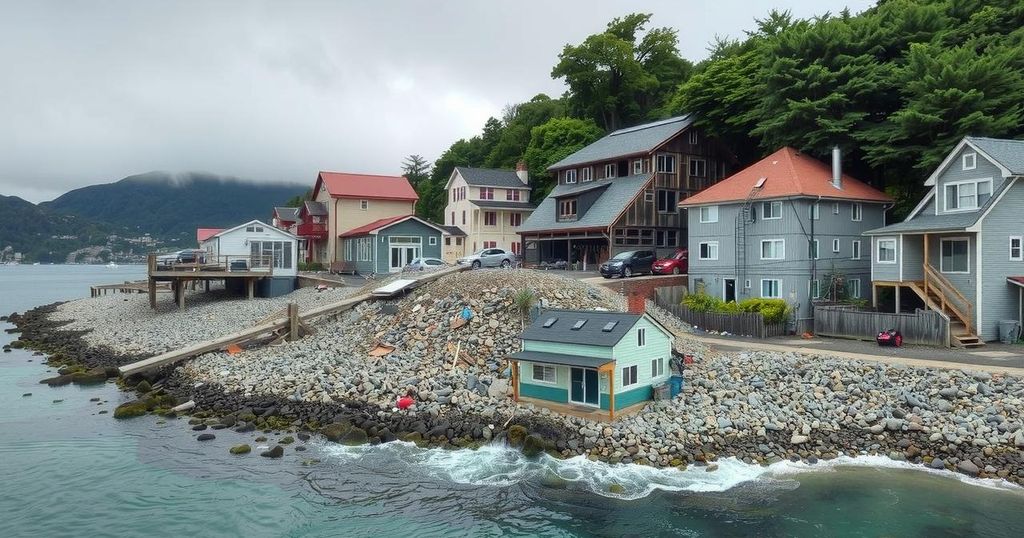Lessons from the Noto Peninsula Earthquake: Addressing Mental Health and Cultural Loss
One year after the Noto Peninsula Earthquake, the aftermath reveals dire mental health challenges and cultural erosion, surpassing the immediate physical destruction. This complex recovery includes addressing the growing suicide rates, isolation among survivors, and the loss of cultural identity. A comprehensive societal response is crucial to prevent further tragedies and ensure holistic healing for affected communities.
One year ago, on January 1, 2024, a powerful 7.6 magnitude earthquake struck the Noto region in Ishikawa Prefecture, causing immediate devastation to homes and infrastructure. However, the far-reaching consequences of this disaster extend beyond physical damage. The ongoing threats of isolation, mental health issues, and a decline in cultural identity are emerging as significant challenges for survivors. This article addresses the less visible repercussions of the Noto Peninsula Earthquake, focusing on the mental health crisis, the erosion of community traditions, and the societal failures that exacerbate these secondary tragedies.
Official reports list over 220 confirmed deaths, yet the hidden toll—often categorized as “disaster-related deaths,” which includes suicides prompted by stress and isolation—has been rising alarmingly. Visiting the area as part of a disaster relief organization, it became clear that survivor isolation is a profound concern. Many, particularly the elderly, face solitude in temporary housing, leading to increased mental health struggles. This sense of disconnection threatens the social fabric of the community, potentially causing lasting emotional scars unless proactive measures are taken.
Disasters not only claim lives but also jeopardize cultural identity. The Noto region, known for its rich traditions and communal gatherings, has seen beloved cultural landmarks reduced to ruins. As individuals cope with the loss of their homes and heritage, an elderly cafe owner poignantly remarked, “It’s not just my cafe that’s gone; more than that, it’s the space we created — where we shared stories and passed down recipes. I worry we’ll lose that forever.” Such sentiments highlight the slower, yet equally devastating, impact of cultural loss that arises from natural disasters.
The reflection on past earthquakes reveals that society has historically neglected the psychological toll of disasters. The aftermath of the Great Hanshin-Awaji Earthquake and the Great East Japan Earthquake illustrated that secondary tragedies, such as suicides, can far exceed death counts. Noto’s rising number of kanrenshi victims emphasizes that these unfortunate lessons remain unlearned, and quick fixes are insufficient. Long-term recovery must prioritize emotional, social, and cultural healing alongside physical reconstruction.
Efforts like Civic Force’s community programs are essential in bridging the gap left by traditional disaster responses. However, a comprehensive approach necessitates a greater commitment to establishing mental health support systems and preserving cultural practices. Documentation of survivor experiences and creation of memorials can sustain the memory of these events and foster needed dialogue about the hidden toll of disasters.
In conclusion, the narratives shared by survivors in Noto underline a crucial responsibility: ensuring that recovery extends beyond infrastructural rebuilding to encompass holistic restoration of lives and communities. It remains imperative for society to reassess its commitment to supporting those affected, recognizing that the threat of future earthquakes will persist. Equally, addressing the emotional and cultural ramifications should be prioritized to prevent the amplification of secondary tragedies.
As we reflect on the earth’s forces that challenge us anew, it is vital that we ask, how can we avoid leaving anyone behind as we build back from the devastation?
The Noto Peninsula Earthquake, which occurred on January 1, 2024, had immediate and devastating physical effects on the region. However, the long-term impacts are equally critical, including mental health crises, increased incidences of suicide, and cultural losses that threaten the community’s identity. Despite the physical destruction being evident, underlying issues of isolation, emotional trauma, and community disintegration present ongoing and significant challenges that are often overlooked in disaster recovery efforts. Understanding these facets is essential for implementing effective support and recovery initiatives.
The Noto Peninsula Earthquake of 2024 serves as a stark reminder that the ramifications of such disasters extend far beyond the immediate physical destruction. Mental health issues and cultural loss are profound crises that can lead to secondary tragedies, including rising suicide rates. Society must learn from past events and adopt a holistic approach to recovery, emphasizing emotional and cultural support alongside rebuilding efforts. It is imperative to ensure that, in the face of future catastrophes, survivors receive comprehensive assistance that addresses both their psychological and social needs, thereby safeguarding the essence of their communities.
Original Source: japan-forward.com




Post Comment